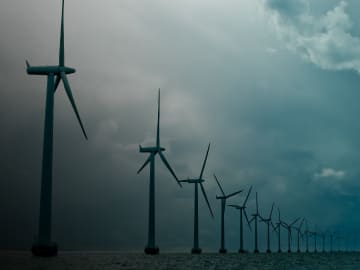The offshore wind farm industry is experiencing great global growth in recent years; offers electricity generation alternatives with renewable sources; and provides the possibility of complementing the energy matrix.
At the same time, it is an industry that requires a high level of technology and a qualified workforce to face the challenges that the marine environment presents for the construction and subsequent operation of wind farms.
This course offers the opportunity to learn the basic concepts of this industry and the principles for the design of its foundations.
Youwind:
Youwind is a company specialized in wind resource assessments and layout design for offshore wind farms.
Regular students at the University (students who are studying for an undergraduate or graduate degree) will not be able to register through the Educación Continua for this course. In case of registration, the Management will proceed with its return.
Dirigido a
Engineering students; and in general to the public, interested in the topic of the offshore wind farms.
The course consists of a part with generalities about the growing offshore wind farm industry; and a more technical part that presents the general concepts for the design of the most common foundation, which is the monopile. For this second part, a second-year student in an engineering school would have the bases to participate in the course.
Objetivos
In the part of the course dedicated to the introduction of this industry, the student at the end of the course:
- Will be aware of the offshore wind farm industry and its participation in the world as an alternative renewable source for electricity generation.
- Will be familiar with the basics of the offshore wind farm industry and electricity generation.
- Will know the main types of foundation for wind turbines for offshore electricity generation.
- Will learn the main construction methods of offshore wind farms.
- Will learn about the recent advances of the Colombian government to promote this industry in the country.
Regarding the technical part, the objective is for the student to understand in general terms the main concepts
underlying the design of offshore wind foundations, in particular the monopile. It is not the intention that the students will be able to do design work themselves following this workshop, but they will have a good understanding of all the key concepts they will need to master should they wish to pursue this field.
Metodología
The course is made up of two parts with face-to-face classes: one part with modules introducing students to generalities about the offshore wind farm industry; and a part with modules covering the main engineering concepts for the design of the monopile type foundation.
Classes will be from Monday to Friday with each day having a session on generalities in this industry and a session on foundation design.
Contenido
The introductory part of the course on the offshore wind farm industry is made up of 6 modules:
- Introduction to the course and introduction to the components of a wind turbine and its foundation.
- An overview of offshore wind energy and the production of electricity by this means in the generation matrix. The components of a wind turbine and those of an offshore park are also presented.
- The cycle of an offshore wind farm project and its financial aspects.
- The planning and construction of an offshore wind farm.
- Getting to know the offshore wind farm industry.
- Introduction to offshore wind farms in Colombia and the government's efforts to promote this renewable energy source.
In addition, there will be two lessons covering:
- The aspect of wind resource, turbine technology, layout design, capacity optimisation, wake losses, blockage, neighbouring wind farms including the importance of levelized cost of energy calculation for project optimisation offshore. (Presented by the consultant YOUWIND).
- Introduction to offshore substations of a wind farm. (Presented by the consultant TORGUN).
Technical part of the course is comprised by four modules:
- The first module of the technical part of the course addresses the design basis: we will cover the overall geometry and characteristics of the monopile, the when will discuss the basis of design, and it’s key components ( metoecean data, fatigue load cases, ultimate limit state load cases etc). We will then cover some very general aspect of soil modelling. And finally, we will discuss how a site is characterized into clusters.
- The second module of the technical part we will get into load assessment; we will first discus the modelling of the soil and the structure itself. We will then discuss structural dynamics, the eigen value problem and damping. In the last section we will discuss some load assessment techniques: time domain -v- frequency domain.
- The third module of the technical part of the course is dedicated to structural design. We will discuss fatigue and ultimate limit state design, with particular attention to fatigue. We will discuss the concepts underlying fatigue assessment, stress concentration factors, and design code requirements.
- In the fourth and final module of the technical part of the course, we will design a monopile from scratch, applying all the concepts listed above.
Condiciones
Eventualmente la Universidad puede verse obligada, por causas de fuerza mayor a cambiar sus profesores o cancelar el programa. En este caso el participante podrá optar por la devolución de su dinero o reinvertirlo en otro curso de Educación Continua que se ofrezca en ese momento, asumiendo la diferencia si la hubiere.
La apertura y desarrollo del programa estará sujeto al número de inscritos. El Departamento/Facultad (Unidad académica que ofrece el curso) de la Universidad de los Andes se reserva el derecho de admisión dependiendo del perfil académico de los aspirantes.














